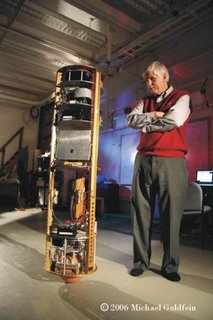This was featured on today's RocketBoom.
Dynamically-Stable Mobile Robots in Human Environments
- Video: response to a disturbance
- Video: point-to-point motion
- "One is Enough!"
- "A Dynamically Stable Single-Wheeled Mobile Robot with Inverse Mouse-Ball Drive"
- Carnegie Mellon University press release, August 9, 2006
Don't believe me? Take a look at the papers. The entire control system is simple LQR. They've added some PI control to correct for some frictional effects, and both coefficients were tuned experimentally. Oh, and there's no ISS discussion in sight. If they ever want this thing to actually track an input, it would be nice if they actually built an input into their system, wouldn't it?
[ update: Need more? Well, on top of this, the critical nonlinearities in this system are sinusoids (gravitational and rotational effects). A sinusoid is not only globally Lipschitz, but it's pretty darn linear around the equilibrium. In fact, if it wasn't, then their linear controller (of which the LQR coefficients are based on the Jacobian linearization of the model!) wouldn't work at all. See? This just isn't an interesting plant to control (inverted pendulums are so 1836; were they ever cool?). ]
So where's the contribution here? I'm not convinced this is even a masters-level project. (perhaps a homework assignment?) This might make for a good undergraduate thesis. That is, it has no significance. It doesn't matter. In fact, it only looks cute to the uneducated.
Does no one do any significant theory anymore?
Technorati Tags: RB, RocketBoom, controls, control science, robotics, robots, ballbot, CMU, Carnegie Mellon University, inverted pendulum, LQR, linear quadratic regulator, PI, proportional integral


2 comments:
Way to call them out Theo. I find it pretty aggravating that they can get away with creating this much hype over something like this, just because they're CMU and famous.
It's a neat project, but doesn't really increase the knowledge in the field of robotics.
Exactly.
Schools like CMU (and MIT, actually) usually plant themselves firmly at the application level, applying sometimes very old work to high budget projects that will someday form prototypes for the companies that fund them.
There's very little going on here that's academic. However, I'm sure that the grad students there will be able to quick quick employment at a robotics company. Few of them, I imagine, will actually go into a true research area in their careers.
Post a Comment